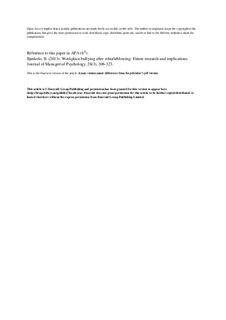| dc.contributor.author | Bjørkelo, Brita | |
| dc.date.accessioned | 2013-04-18T07:55:36Z | |
| dc.date.available | 2013-04-18T07:55:36Z | |
| dc.date.issued | 2013 | |
| dc.identifier.uri | http://hdl.handle.net/11250/174696 | |
| dc.description | This article is © Emerald Group Publishing and permission has been granted for this version to appear here (http://brage.bibsys.no/politihs/?locale=en). Emerald does not grant permission for this article to be further copied/distributed or hosted elsewhere without the express permission from Emerald Group Publishing Limited. | no_NO |
| dc.description.abstract | Findings: Empirical research has documented the link between whistleblowing and workplace bullying and the devastating effects on health that may follow (e.g. depression and symptoms analogous to post traumatic stress). Implications for practice are as follows: first, to provide clear examples of unwanted workplace behavior; and second, to help clinicians to gain a balance between the client's need to re-tell and the need for psychological treatment. | no_NO |
| dc.language.iso | eng | no_NO |
| dc.publisher | Emerald | no_NO |
| dc.subject | whistleblowing | no_NO |
| dc.subject | workplace bullying | no_NO |
| dc.subject | health | no_NO |
| dc.subject | depression | no_NO |
| dc.subject | clinicians | no_NO |
| dc.subject | varsling | no_NO |
| dc.subject | mobbing | no_NO |
| dc.subject | arbeidsmiljø | no_NO |
| dc.subject | helse | no_NO |
| dc.subject | depresjon | no_NO |
| dc.subject | behandling | no_NO |
| dc.title | Workplace bullying after whistleblowing: Future research and implications | no_NO |
| dc.type | Journal article | no_NO |
| dc.type | Peer reviewed | no_NO |
| dc.source.pagenumber | 306-323 | no_NO |
| dc.source.volume | 28 | no_NO |
| dc.source.journal | Journal of Managerial Psychology | no_NO |
| dc.source.issue | 3 | no_NO |
| dc.identifier.doi | 10.1108/02683941311321178 | |
